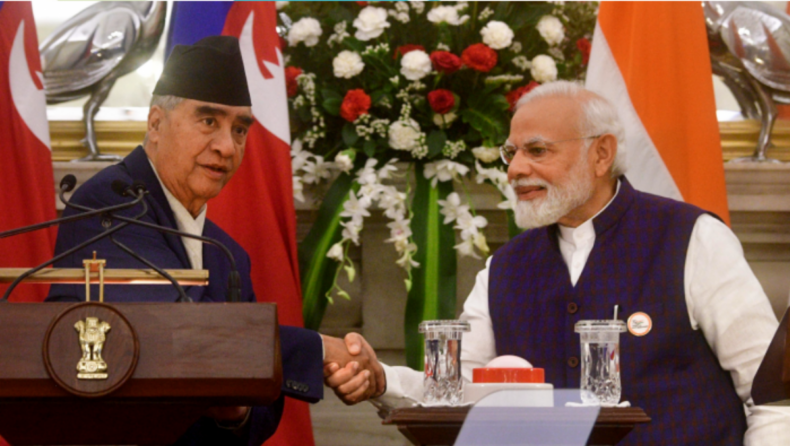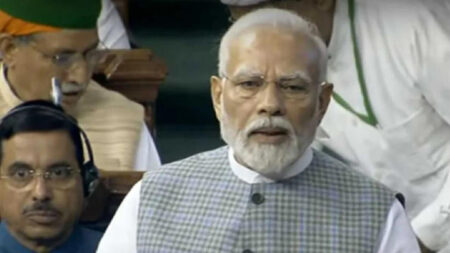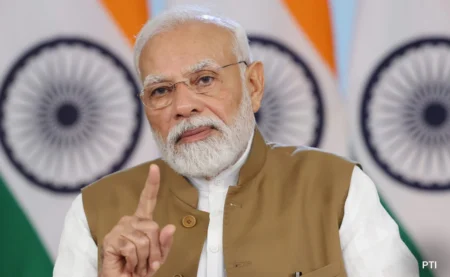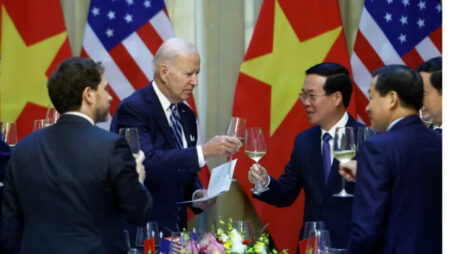India and Nepal on Saturday launched several projects on connectivity and energy cooperation initiatives, including a cross-border passenger train.
Nepalese Prime Minister Sher Bahadur Deuba urged his Indian counterpart PM Modi held high level talks at Hyderabad house in New Delhi. The two sides inked 4 key pacts which aims to expand co-operation in the areas of Railways and energy between the two nations.
The border issue had become a major irritant in bilateral ties under his predecessor, KP Sharma Oli. The previous Nepal government had issued a new political map and claimed territories of Kalapani, Limpiyadhura, and Lipulekh Pass.
The Indian side made it clear that both countries need to address the boundary issue through dialogue and to avoid the politicization of such issues.

The focus of the meeting between the two prime ministers was on developmental cooperation including a joint vision statement for power cooperation that envisages joint development of projects and transmission infrastructure.
Cross-border rail link
PM Modi and PM Deuba launched the 35 km cross-border railway line linking Jaynagar in Bihar to Kurtha in Nepal and flagged off the inaugural run of a train with a capacity of 1000 passengers which will be operated by Nepal Railway Company (NRC)
This is the first broad-gauge passenger rail link between the two sides and it will be extended to Bardibas in Nepal under a project supported by an Indian grant of ₹548 crores.
For the convenience of passengers, 8 stations, 6 halt stations, and 47 road crossings have been made constructed on this rail section connecting the two countries, and a total of 127 minor bridges and 15 major bridges have been constructed on the newly gauged converted Jaynagar-Kurtha rail section of 34.9 km.
The rail services between Jaynagar and Bijalpura in Nepal had been introduced in 1937 by the British but were suspended after the Nepal floods of 2001. India from its side has spent around ₹10 billion to rebuild the old railway track and the Nepal government has purchased 2 train sets for around ₹1 billion.
With the activation of this rail track, we will witness the first broad gauge rail service to Nepal before this Jayanagar and Janakpur operated a narrow-gauge service which was looked over by Nepal.
Solu Corridor
The Indian side handed over the Solu corridor which is a 90 km, 132 kV power transmission line built for ₹200 crores under an Indian line of credit.The line will help bring electricity to several remote districts in northeastern Nepal by connecting them to the country’s national grid.
Rupay Card
PM Modi and PM Deuba also launched India’s RuPay card in Nepal. The domestic variant of the RuPay card will now work at 1400 point-of-sale machines in Nepal and the move is expected to facilitate bilateral tourist flows.
Nepal will become the fourth country after Bhutan, Singapore, and the UAE where RuPay will be live.
ISA
Nepal has signed a framework agreement to join the India-led International Solar Alliance, India will import power from Nepal, which, for its part signed a framework agreement to join the Prime Minister Narendra Modi-initiated International Solar Alliance.
PM Modi addressing this event said “It is a matter of happiness that Nepal is exporting its surplus power to India. This will make positive contributions to the economic development of Nepal. I am delighted to announce that several more proposals for importing power from Nepal are being approved.
I am happy that Nepal has become a member of the International Solar Alliance. This will promote sustainable, affordable, and clean energy in our region.”
Nepal and India also signed three more pacts which represent a Memorandum of Understanding (MoU) on enhancing technical cooperation in the railway sector and two more agreements between Indian Oil Corporation and Nepal Oil Corporation for the supply of petroleum products and technical expertise in the next 5 years.
Joint Vision Statement
The joint vision statement on power cooperation committed the two sides to work for joint development of power generation projects in Nepal.
Development of cross-border transmission infrastructure, bi-directional power trade based on market demand, and coordinated operation of national grids. Nepal also invited Indian firms to invest in the development, construction, and operation of renewable and hydropower projects.
PM Deuba on a note said, “Nepal’s relations with India are highly important and said his country is eager to benefit from India’s progress through a mutually beneficial economic partnership”.
Pm Deuba also sought the enhancement of cooperation in civil aviation including additional air routes and the early delivery of 150,000 tons of chemical fertilizers by India.
Published By – Damandeep Singh
Edited By- Kritika Kashyap













